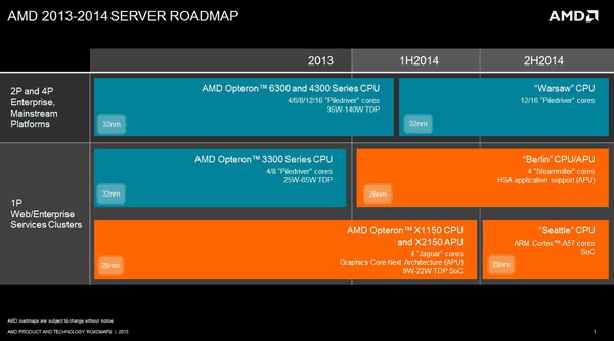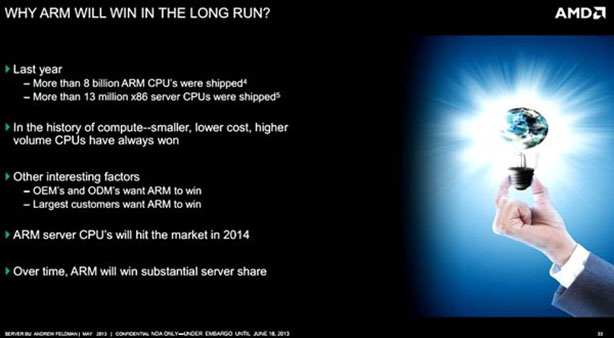With its 2013-2014 server roadmap, AMD has revealed that its first 64-bit ARM-based server chips, codenamed Seattle, are set to be sampled in Q1 2014 and ready for production in the second half of 2014.
While the chips were first announced last year, the roadmap has shed light on previously unknown details about them. Seattle will be based on ARM's Cortex-A57 cores and a 28nm manufacturing process, and will be made available first as an 8-core CPU and secondly as a 16-core one. As AMD is keen to emphasise, upon its release, Seattle will be the industry’s first such server system on chip. It will also be the first AMD processor to utilise its Freedom Fabric technology, acquired in its buyout of SeaMicro last year.
AMD expects its new chip family to 'provide category-leading throughput as well as setting the bar in performance-per-watt' and to 'set the bar in power-efficient server compute'. It also claims that it will outperform the recently announced AMD Opteron X-Series of processors, based on AMD's own Jaguar cores, by between two and four times, and expects Seattle to reach speeds of at least 2GHz.
As well as 128GB DRAM support, Seattle will deliver 'extensive offload engines for better power efficiency and reduced CPU loading, server calibre encryption, and compression and legacy networking including integrated 10GbE.'
Details were also unveiled new about the company's Berlin and Warsaw processors. The former will be available as both a CPU and APU and based on a set of four of AMD's upcoming 28nm Steamroller cores. Berlin is designed to offer almost eight times the gigaflops per-watt of the Opteron 6386SE processor and consequently offer a large rack density. It will also be the first server APU built on AMD's Heterogeneous System Architecture, which AMD claims 'makes [GPGPU] programming as easy as C++.'
Finally, Warsaw is AMD's next-generation offering in its two and four socket enterprise platforms, and as such is optimised for heavily virtualised enterprise workloads. Set to supercede the Opteron 6300 family, the Warsaw CPUs will be based on 12 or 16 of AMD's existing 32nm Piledriver cores and provide 'significantly improved performance-per-watt' over said family while also providing an apparently seamless migration path from one to the other.
Both Berlin and Warsaw are expected to be available in the first half of 2014.



5 comments
Click here for commentsWhat the hell is an ARM cpu going to do with 128GB of ram? Next thing you know the Z80 will have support for 1GB of ram. I'm still waiting for a reason to use ARM over x86 on a server.
ReplyThere are some applications where you care more about memory and I/O performance than CPU power, so buying a slower (but smaller, cheaper and lower power) core makes sense.
ReplyARM is ideal for home servers, since you want something that is low power and doesn't produce a lot of noise. I suppose it's also good for mainframe servers, where number of threads matters more than pipeline length. ARM is also good in servers because:
Reply* Physically small and light weight
- You can cram more processors into the same board or chassis
- Reduced costs of shipping
* ARM platforms are generally cheaper
* ARM performs best on Linux, which a massive % of servers use
* Less power consuming and generally better power management than x86
- Less heat
- Less noise
- Lower power bills
- Cheaper and easier to maintain emergency UPSs
- Longer lifespan
- Lesser need of equipment and parts to keep the processors cool
ReplyI think intel is best
nillchele
Replyi think intel is best
Conversion Conversion Emoticon Emoticon